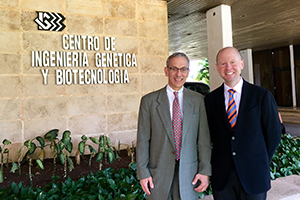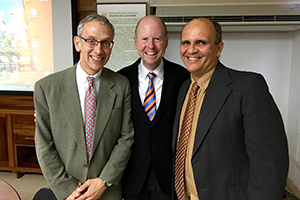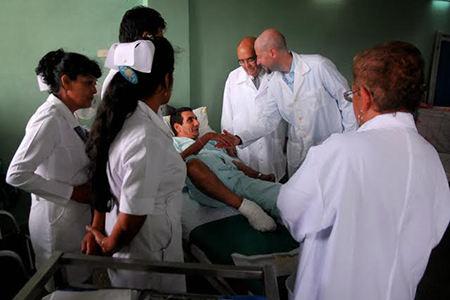Looking for ways to bolster tissue healing in diabetic foot ulcers, two University of Arizona Health Sciences (UAHS) physician-scientists are pursuing a groundbreaking partnership with researchers in Cuba to steward Food and Drug Administration approval of a diabetic foot ulcer healing drug for use in the United States.
Every 20 seconds a person with diabetes undergoes an amputation resulting from a diabetic foot ulcer. Ulcers are caused when a person with diabetes loses sensation in the foot and cannot feel a blister forming. Left unchecked, an ulcer can lead not only to amputation but death.
The drug, Heberprot-P, has been used in Cuba since 2006 and is being used in 26 other nations. The drug contains a recombinant human epidermal growth factor that accelerates healing of deep and complex ulcers via localized injections. Developed by the Cuban Center for Genetic Engineering and Biotechnology, Heberprot-P has resulted in rapid wound healing, 75 percent reduction in amputations and a longer and better quality of life for diabetic patients treated with the drug.
 To date, the embargo on Cuba has left the U.S. without access to this life-saving drug, but as the U.S. begins normalizing relations with the country, UA Health Sciences physician-scientists David Armstrong, DPM, MD, PhD, and Marvin Slepian, MD, have begun discussions with the Cuban researchers to pursue potential clinical development for the drug’s use in the United States.
To date, the embargo on Cuba has left the U.S. without access to this life-saving drug, but as the U.S. begins normalizing relations with the country, UA Health Sciences physician-scientists David Armstrong, DPM, MD, PhD, and Marvin Slepian, MD, have begun discussions with the Cuban researchers to pursue potential clinical development for the drug’s use in the United States.
Dr. Armstrong is professor of surgery at the UA College of Medicine – Tucson and director of the Southern Arizona Limb Salvage Alliance (SALSA), a collaborative clinical and research alliance based at the UA Health Sciences dedicated to advancing care of the diabetic foot and preventing amputations in North America and worldwide. SALSA is the most productive research unit of its kind in the world with more than 10,000 patient visits per year, Dr. Armstrong said.
Dr. Slepian is professor of medicine (cardiology) at the UA Sarver Heart Center, and professor and associate department head of biomedical engineering at the UA College of Engineering, and a McGuire Scholar in Innovation and Entrepreneurship in the Eller College of Management. Dr. Slepian also directs a new center at the University of Arizona – the Arizona Center for Accelerated Biomedical Innovation (ACABI). ACABI helps researchers form collaborations, find applications for new discoveries, develop their technologies and access resources to move their innovations forward. It is focused primarily on the development of translational biomedical technologies.
 ACABI, in partnership with SALSA, is working with U.S. officials and Jorge Berlanga, DVM, MS, PhD, who helped develop Heberprot-P in Cuba, to gain FDA approval for the new diabetic ulcer drug therapy’s use in the United States. Although clinical trials are extremely expensive, the resulting FDA approval for new drugs and their use in the United States is considered the “gold standard” by many physicians and pharmaceutical companies and adds enormously to the market value of the medication.
ACABI, in partnership with SALSA, is working with U.S. officials and Jorge Berlanga, DVM, MS, PhD, who helped develop Heberprot-P in Cuba, to gain FDA approval for the new diabetic ulcer drug therapy’s use in the United States. Although clinical trials are extremely expensive, the resulting FDA approval for new drugs and their use in the United States is considered the “gold standard” by many physicians and pharmaceutical companies and adds enormously to the market value of the medication.
“Further testing and deployment worldwide of Heberprot-P with FDA approval would provide an opportunity to assess the product’s potential to address an important unmet medical need,” said Dr. Berlanga.
According to the American Diabetes Association, in the United States alone more than 73,000 diabetic patients undergo amputations each year, or about one every 7 minutes. Of those who do undergo a leg amputation, more than half die within three years.
 “The cost of treating severe diabetic wounds is more expensive than the five leading cancers in the United States. There is a big disconnect between public health need and pharmacological focus in the United States. Our ability to partner with colleagues in Cuba and to bring this medication to clinical trials in our nation is potentially important in our ability to heal wounds and improve lives, worldwide,” said Dr. Armstrong.
“The cost of treating severe diabetic wounds is more expensive than the five leading cancers in the United States. There is a big disconnect between public health need and pharmacological focus in the United States. Our ability to partner with colleagues in Cuba and to bring this medication to clinical trials in our nation is potentially important in our ability to heal wounds and improve lives, worldwide,” said Dr. Armstrong.
“The University of Arizona and its inter-professional commitment to clinical translational science can help accelerate the process of transforming laboratory discoveries into new treatments for patients. ACABI was designed to facilitate these efforts with drug discovery, development and access to resources such as the clinical trial expertise that SALSA can provide. The collaboration with Cuba is a unique example of the UA stewarding innovation in clinical translational research and millions of people in need will benefit from the effort,” said Dr. Slepian.
On March 21, President Obama will travel to Cuba to advance efforts to normalize relations. On March 29, Dr. Armstrong will present information about this effort and other cutting-edge research at the University of Arizona’s SALSA to the Congressional Caucus on Diabetes.
About the University of Arizona Health Sciences
The University of Arizona Health Sciences is the statewide leader in biomedical research and health professions training. The UA Health Sciences includes the UA Colleges of Medicine (Phoenix and Tucson), Nursing, Pharmacy and Mel and Enid Zuckerman College of Public Health, with main campus locations in Tucson and the growing Phoenix Biomedical Campus in downtown Phoenix. From these vantage points, the UA Health Sciences reaches across the state of Arizona and the greater Southwest to provide cutting-edge health education, research, patient care and community outreach services. A major economic engine, the UA Health Sciences employs almost 5,000 people, has nearly 1,000 faculty members and garners more than $126 million in research grants and contracts annually. For more information: http://uahs.arizona.edu/


